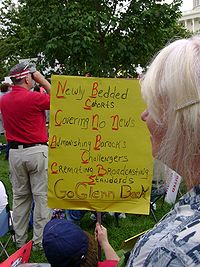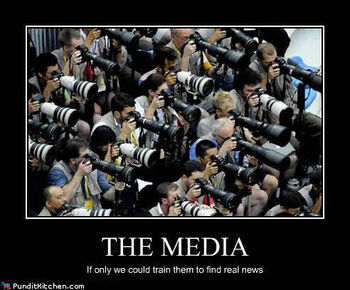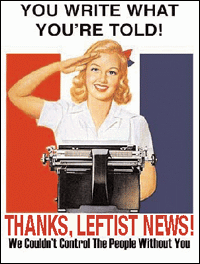- For a more in-depth analysis of the leftist bias ingrained in the mainstream media, see Media bias and Liberal bias
The mainstream media (MSM), at times referred to as the lamestream media[1] for satirical purposes, are print and broadcast organizations that report on news events. The mainstream media dates back to the start of the nation where politicians and printers would prepare "broadside" news sheets. The format of the media has evolved to include multi-page newspapers printed on high-speed offset presses, radio, television and online websites. Traditionally, media has been supported by a combination of subscriptions, newsstand sales and advertising. These revenues pay the cost of distribution as well as the journalists who write the content.
Because news gathering is expensive, over time the mainstream media has found ways to share content and to distribute the cost of journalism over a wider set of customers. Radio and television stations formed networks to share content. Print media formed organizations like United Press International and the Associated Press to share coverage and photos. Some newspapers share printing operations, and other media organizations such as Copley and Gannett have purchased a large number of newspapers resulting in shared administrative costs. Although media started with a large number of competing news outlets operated locally, over time, media ownership and control has become more centralized in large organizations. The increasingly liberal media organs censor the dissemination of honest news and repeatedly apply liberal double standards.
The common denominator of the "mainstream media" is their censoring or downplaying stories that would lead viewers to conservative conclusions, and their use of photo bias, placement bias and other forms of deception to mislead viewers into drawing incorrect liberal conclusions. The term mainstream media usually refers to how the majority of commercial-based or taxpayer-funded news reporting and commentary consist of liberal bias, while falsely pretending to be objective providers of information. In addition to promoting forms of censorship, the mainstream media has increasingly promoted or condoned (or in some cases, even ignored or denied) the violence of the Antifa and other Leftists.[2]
| “ | They [the media] are not becoming irrelevant, but they are getting to the point where they are worse than irrelevant,” and “They’re the scourge of the American people. | ” |
| “ | The Greens and ‘progressives’ more or less own the mainstream media. | ” |
| “ | The FAKE NEWS media (failing @nytimes, @NBCNews, @ABC, @CBS, @CNN) is not my enemy, it is the enemy of the American People! | ” |
Examples include:
- Without any evidence of church attendance or Bible-reading by the defendant accused of murdering 92 people in Norway, the headline of the leading Australian newspaper declared, "Norway suspect 'fundamentalist Christian.'"[6] The headline appears to be based in part on a Facebook page that was likely not even authentic.
It is clear that the mainstream media is extremely biased towards the left-wing, and this was the case since at least the 1960s, with a strong leftist monopoly on the news which promotes false conclusions.[7] The 2016 election of Republican businessman Donald Trump prominently displayed the blatant leftist bias of the media.[7][8][9][10] Trump found a way to get his message out to the public without needing to go through the lens of the leftist media, and some liberals suggested ways in how to force Trump to have to deal with the corrupt media.[11] When President Trump accused the Obama administration of surveilling him, the leftist media hideously mocked him as "paranoid", "delusional", and "demented" and as evidence he should be removed from office for mental health reasons. [12] One year later when the New York Times admitted the facts based on leaks from Obama administration intelligence community leaders anxious to keep themselves out of jail, no apologies or retractions were forthcoming, effectively refusing to admit that Trump was right.
Contents
Fairness Doctrine[edit]
In 1987, the Federal Communications Commission voted 4–0 to revoke the Fairness Doctrine. The Fairness Doctrine mandated that if any opinion considered "controversial" were ever discussed on the public airwaves, the station over which that opinion aired was required to give equal time to any person wishing to reply. However, the FCC never set a standard about interpretations of current events that might be disputable, or even examined that issue.
With the revocation of the Fairness Doctrine, radio and television stations were now permitted to air any opinion or interpretation of the news, no matter how "controversial," without regard to the giving of "equal time."
In the wake of the repeal of the Fairness Doctrine, on August 1, 1988, a new radio commentator named Rush Limbaugh began broadcasting in national syndication.
List of mainstream media organs[edit]

Mainstream media outlets are based in New York, Washington and Los Angeles.[13] Significant mainstream media outlets include:
Newspapers
- The New York Times
- The Washington Post
- The Boston Globe
- The Philadelphia Inquirer
- The Atlanta Journal-Constitution
- The Los Angeles Times
- The San Francisco Chronicle
- USA Today
- The Rolling Stones (magazine)
- The Wall Street Journal[14]
- All major, standard-newspaper-format dailies that have existed since before the Fairness Doctrine repeal.
News Syndication Agencies
Television
- CBS
- NBC
- ABC
- National Public Radio
- Public Broadcasting Service
- The Cable News Network
- Fox News (see below).
Some media consumers do not consider Fox News to be part of the "mainstream media" as Fox News frequently presents viewpoints that do not fall in line with other mainstream outlets. For example, in 2007, the Democrat presidential candidates declared that they would not appear in debates hosted by Fox News, but they did appear on other MSM news outlets.
However, ratings indicate that because of its massive popularity, Fox News could be considered to be part of the mainstream media by definition. According to ratings organization Nielsen:
- Fox News has the 10 most viewed cable TV news shows (as of Dec 2009).
- Fox News mean prime-time viewing figures are triple that of MSNBC, and double that of CNN, and exceed the total ratings of CNN, MSNBC and CNBC combined.
- "In 2006, more than half the people watching cable news were watching Fox News" [15]
CNN[edit]
For a more detailed treatment, see Cable News Network.
In 2006 CNN.com ran an article by columnist R. Emmett Tyrell Jr. entitled "Tyrell: Goodbye MSM... and good riddance!" [16] Examining the relationship between the alternative press and the MSM, Tyrell writes:
So we hear this week that President George W. Bush is taking delight in the spread of the "alternative press" (read conservatives on the Internet, in talk radio, in print, and at Fox) and the gentle detumescence of "mainstream media" (read liberal media, or more precisely, Democratic media). Well I join him in his satisfaction.
'Alternative Media'[edit]
Differing opinions also exist over the definition of a similar term - Alternative Media. Although some consider, for example, Rush Limbaugh's launch to be the birth of "alternative media", so too do the Left consider publications like The Nation to be "alternative media".[17] In fact, many would view the Village Voice group to be the most widely published "alternative media" outlet in the United States.
By whatever definition, most media watchers would classify as "alternative media" any media organ that is primarily hosted on the Internet rather than printed and delivered or mailed to subscribers. The alternative media is not exclusively conservative. It includes liberal organs as well. Some writers on these organs have suggested that the mainstream media has a conservative bias—by which they actually mean that mainstream-media organs are not as revolutionary, or as radical, in their thinking as are the writers themselves.[18][19][20]
At least one MSM organ, CBS News, attempted in 2006[21] to describe what a particular alternative-media segment (i.e., blogs) thinks of the MSM:
| “ | They don't believe that you are unbiased, objective, fair a lot of times. And so what they want is they want to read a lot of different sources themselves. because they don't trust the mainstream media..that would be [you]. | ” |
It is worth noting that liberal blog activity on the internet declined after the election of Barack Hussein Obama,[22] and continued to decline after his reelection. This shows that the distaste for bias in the liberal MSM is spreading to the alternative media.
See also[edit]
- Liberal media
- Advocacy journalism
- Journalistic malpractice
- Deaths directly attributed to the liberal media
- Alternative media
- Biased journalists of the Obama administration
- Left-wing smear machine
- Media-intelligence complex
- Government by Journalism
- Media hypocrisy
- Mainstream media and Donald Trump
External links[edit]
- Media Bias Basics.
- Media Bias Is Real-Finds UCLA Political Scientist.
- Bias Alert.
- Who Controls the Media?
- Ownership Chart: The Big Six.
- Media Lies on Libya Ongoing.
- Chapter Thirteen: Hijacking the Media, The Epoch Times (from How the Specter of Communism Is Ruling Our World).
References[edit]
- ↑ https://www.politico.com/story/2009/11/palin-trashes-lamestream-media-029693
- ↑ Nolte, John (September 1, 2017). As Its Influence Wanes, Increasingly Militant MSM Promotes Violence and Censorship. Breitbart News. Retrieved September 2, 2017.
- ↑ Tea Party Must Stand Up to Liberal Smear Tactics, Conservative Activist Says, CNSNews, September 14, 2010
- ↑ Political Correctness Was Invented In Nazi Germany
- ↑ Donald Trump official Twitter page
- ↑ Norway suspect 'fundamentalist Christian'
- ↑ 7.0 7.1 Hanson, Victor Davis (December 22, 2016). The Trump Nail in the Media Coffin. National Review. Retrieved December 28, 2016.
- ↑ Brown, Michael (October 19, 2016). The Undeniable, Glaring Bias of the Mainstream Media. Townhall. Retrieved December 28, 2016.
- ↑ Riddell, Kelly (November 8, 2016). Mainstream Media Maligned: 10 Examples of Blatant Bias. The Washington Times. Retrieved December 28, 2016.
- ↑ Goodwin, Michael (November 14, 2016). Trump's victory is about change. And our biased mainstream media must change, too. Fox News. Retrieved December 28, 2016.
- ↑ MSM shouldn’t cover Trump's tweets, forcing him to rely on media to communicate – CNN anchor. RT. December 28, 2016. Retrieved December 28, 2016.
- ↑ https://thehill.com/opinion/white-house/388436-after-year-of-investigation-trump-can-rightly-claim-some-vindication
- ↑ Liberal media distort the gun debate; loaded language misleads the public - Emily Miller, Washington Times
- ↑ The inclusion of The Wall Street Journal might strike some media observers as strange, until one remembers that, though its editorial board is conservative on most issues (except for immigration), its city room is definitely liberal in orientation and coverage of the news.
- ↑ Authors unknown. "The State of the News Media 2007." Project for Excellence in Journalism, 2007. Retrieved August 2, 2007.
- ↑ Tyrell, R. Emmet. "Goodbye MSM... and good riddance!" Creators' Syndicate, 2006. Retrieved August 2, 2007, from CNN.
- ↑ Albert, Michael. "Alternative Media: What Makes Alternative Media Alternative?" Z Magazine. Retrieved August 2, 2007.
- ↑ Dreier, Peter. "For a Brief Moment, The Media Rediscover Poverty." AlterNet.org, July 26, 2007. Retrieved August 2, 2007.
- ↑ O'Connor, Rory. "The Future of Citizen Journalism. AlterNet.org, July 3, 2007. Retrieved August 2, 2007.
- ↑ Rampton, Sheldon. "Has the Internet Changed the Propaganda Model?" AlterNet.org, June 22, 2007. Retrieved August 2, 2007.
- ↑ Pogue, David. "Brave New Blogging World: David Pogue Ventures Into The Blogosphere." CBSNews.com, July 9, 2006. Retrieved August 2, 2007.
- ↑ http://bloggasm.com/blog-traffic-for-liberal-blogs-down-58-in-three-months-following-election-conservative-blogs-down-36
| |||||||||||||||||||||||||||||

